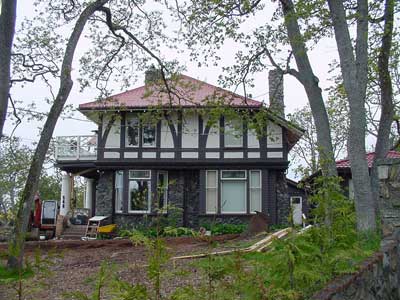ARCHITECTURE:
This Eclectic British Arts & Crafts house is two-storied and hip-roofed with exposed rafter tails. The garden façade on the left side has three sections separated by four Tuscan columns. The gabled square bay on the far left has bracketed, carved bargeboards and sits over an angled stone-clad bay. On the far right is a hipped, through-the cornice wall dormer. The main floor of the central portion is a conservatory. A porch to the right, originally topped by a pergola, now has a second-storey balcony. The street façade has an angled bay beside a square bay on the main floor. The upper floor has Tudor Revival stucco and half-timbering, the lower floor is largely stone, and the right side is shingled. The external chimney was orignally all stone; the upper portion is now stuccoed. There are battered stone piers on the corners. The roof has always been tiled. The house was built for $8,000.
ORIGINAL OCCUPANTS:
Charles Joseph Vancouver Spratt (1873-1941) was a shipbuilder, born in Victoria and educated at Port Hope, ON. He married Marguerite Ethel Deuel (1872-1946) of Sacramento, CA, c.1894. They first lived at Armitage on Gorge Rd. Charles’s father was Joseph Spratt (1835- 1888), an Englishman who established a foundry in San Francisco, then came to Victoria in 1858. Joseph entered the shipping business, and acquired three steamers – the Caribou Fly, Emma and the Wilson G. Hunt. He established the successful Albion Iron Works on Discovery St by 1862, which eventually expanded to an area bounded by Pembroke, Store, Chatham and Government Sts . Prominent Victoria citizens Robert Dunsmuir, R.P. Rithet, Robert Ward and Joseph Trutch were among Albion’s directors. Joseph retired from active management of the iron works in 1882, and established Spratt’s Wharf and Spratt’s Ark, a floating cannery, in 1883.
After Joseph died in California in 1888, Charles entered into partnership with Andrew Gray, the manager of Albion Iron Works. In 1898 they started what eventually became Victoria Machinery Depot (VMD). Albion Stove Works (2101 Government St, Burnside) was formed in 1905, and the Albion name remained in use until 1928, when the business was closed. Charles’s health started to fail and in 1921 his wife Marguerite assumed control of the business, which built 25 ships during WWII and employed thousands of Victorians. Her achievements were remarkable and she was likely one of the first women in North America to play such a role. When Marguerite died in 1946, her estate was valued at $471,000 and part of this was left to St. Joseph’s Hospital and the SPCA. Her pet terrier “Rip” was a beneficiary, and he was provided with a companion housekeeper and occupancy of the house until shortly before his death in 1949.
OTHER OCCUPANTS:
Sisters Gladys Evelyn (1890-1975) and Gwendolyn Norah (1894-1994) Hewlings bought this house in 1950, and lived here until their deaths. They were born in Victoria to Frederick Hayes and Grace (Swinnock) Hewlings. Gladys taught piano and was active with St. John Ambulance. Gwen graduated from Royal Victoria College, affiliated with McGill University, in 1913, and taught at Tillicum and Cedar Hill Schools, then Esquimalt High School from 1917. In 1926 she became principal of that school – the first woman High School principal in BC. For unknown reasons she gave up the position to Clive Kelly the next year. Gwen taught English Literature, French and Drama. The Esquimalt Drama Club always took top honours in the Greater Victoria Drama Festival, and she received the Canadian Drama Award in recognition of her contribution to the performing arts. Gwen was a world traveller, collector of antiques, patron of the arts, student of Shakespeare and a popular teacher.

